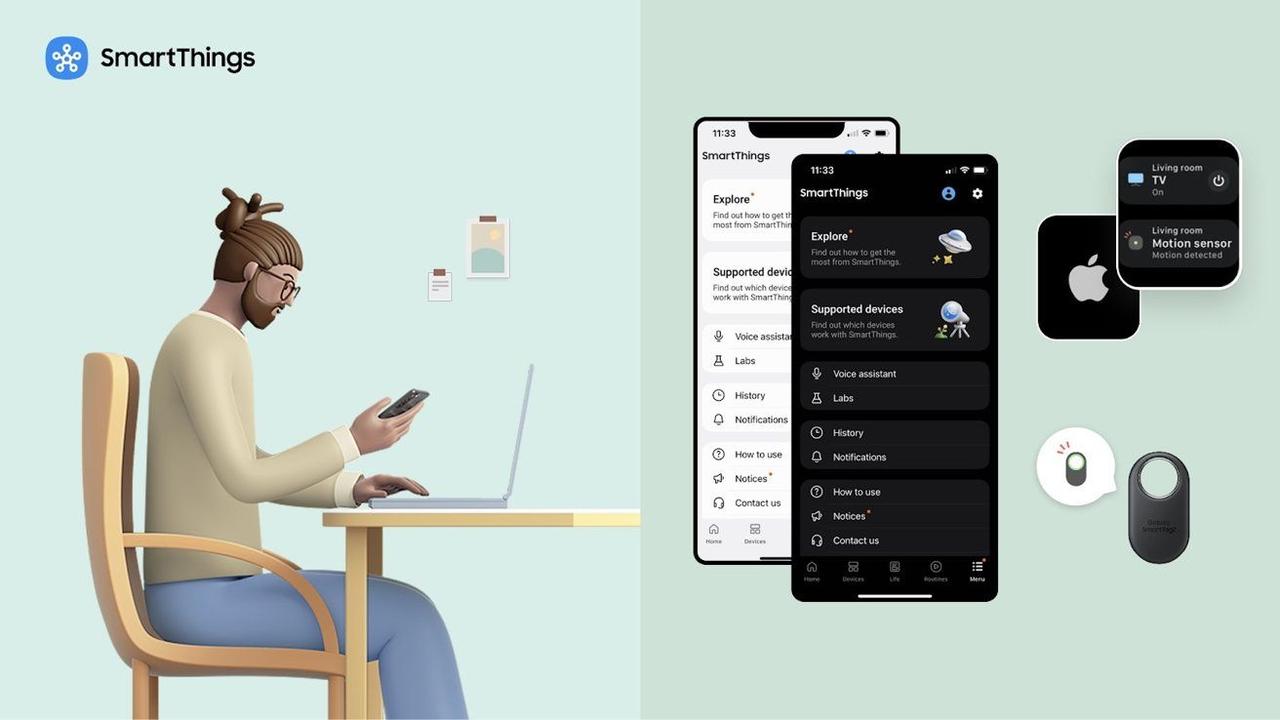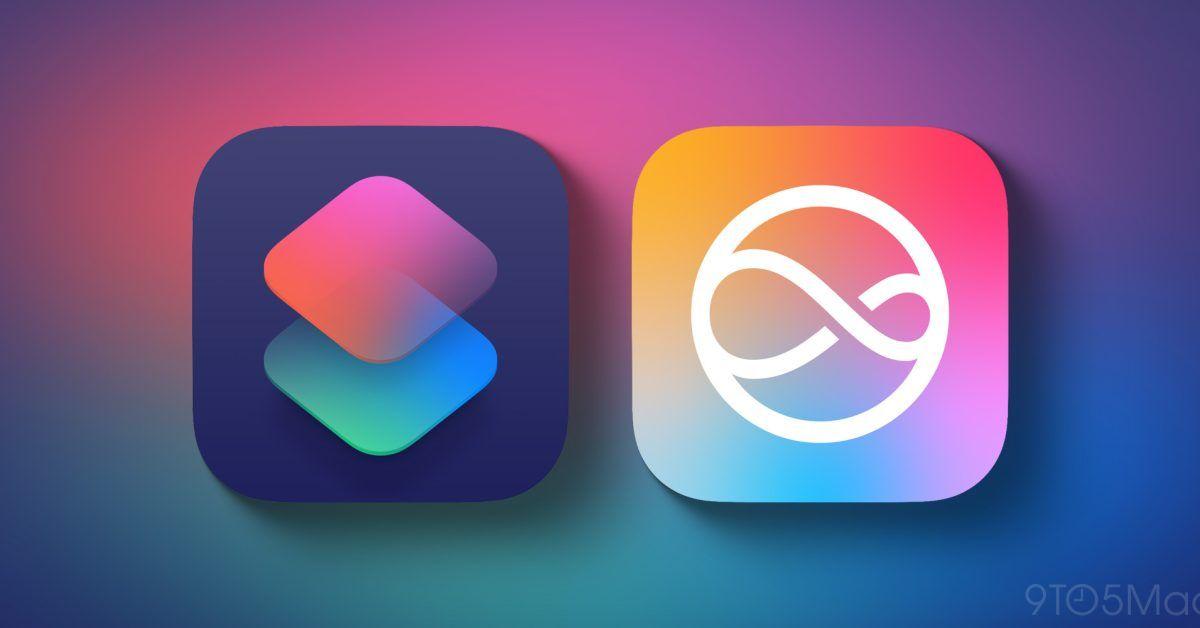Samsung Outpaces Apple in Smart Home AI: Introduces Natural Language Automation and Cross-Platform Integration
2 Sources
2 Sources
[1]
This smart home tech is another way Apple is falling behind in AI - 9to5Mac
Samsung is first to launch the new feature: the ability to use natural language to simply tell your smart home app what it is you want it to do ... Samsung Smart Things is effectively the Korean company's equivalent of HomeKit. All compatible devices can be controlled through a single app on the company's smartphones, in exactly the same way the Home app can be used on iPhones. Currently, configuring a new automation in Apple's Home app isn't a very user-friendly experience for non-techy users. What Samsung has just announced, and The Verge reports is available now in its app, is a Routine Creation Assistant to automate scene-creation. This lets you type a phrase describing what you want your home to do in the SmartThings app -- like "turn off all the lights whenever I leave the house" -- and it will set it up without you needing to configure each device or setting. While that particular example is easy enough to do in Apple's Home app, as there's a specific "when the last person leaves home" trigger, other routines can be trickier for normal people. For example, I have a timed automation for when I start work. This closes my office blind, switches on lighting to a cool color temperature for concentration, and switches off lights in other rooms. Configuring this required me to create a scene, add accessories, specify their state, and then create an automation to activate that scene at a certain time on certain days (I do it this way so that I also have the option of manually activating the scene). For someone who isn't used to the kind of flow and logic involved, creating this kind of thing can definitely be intimidating. If Samsung's app lets you create arbitrary automations as easily as telling the AI what you want, that's a huge step forward in making smart home tech appealing to mass-market consumers. And it's not just Samsung: both Amazon and Google are already beta-testing exactly the same type of natural-language functionality. So pretty soon, Apple - once the leader in making smart home tech friendlier - could be the only major platform not to offer this. Another area where Samsung is pulling ahead is by adding time delays. Another update to SmartThings routines is the option to schedule multiple timed steps using a Delay Actions feature. For example, Samsung says, "Users can now create a 'Good Morning' routine that turns on bedroom lights at 7:00 a.m. [and] starts the coffee maker 15 minutes later." I've often wanted that ability, for example a goodnight routine that switches on the bedroom lights and turns off the rest, but waits 30 seconds before switching off the hallway lighting to show the way to the bedroom. Finally, Samsung also lets you opt for a notification you tap to confirm you want something to run, which could be useful where you can anticipate potential clashes between timed automations and manually-activated scenes, depending on things like when people get up in the morning. Shortcuts would be one way of doing this kind of thing, but that's a lot clunkier than being able to do everything in one simple app. Apple has some catching up to do here.
[2]
Samsung boosts SmartThings with AI routines & expanded Apple support
Samsung is giving iOS users new ways to control their smart homes with AI-powered routines and improved Apple Watch integration. Samsung's SmartThings platform is getting a major upgrade for Apple users. It adds new iOS features that aim to simplify smart home control and broaden integration across devices. The company announced an AI-powered Routine Creation Assistant that lets iOS users type simple phrases to build custom automations. For example, you can write "Turn off all the lights when I leave the house" to generate a full automation without manual setup. Samsung says the assistant uses large language model technology to lower barriers for new users while speeding up configuration for experienced ones. These updates reflect Samsung's push to make SmartThings a true cross-platform ecosystem. The latest iOS version now includes Dark Mode support, expanded Apple Watch controls, and new options for sharing SmartTag locations with Apple users. The additions come as Samsung seeks to maintain parity with Google Home and Apple Home by making its automation platform accessible on as many devices as possible. Apple Watch users get more control SmartThings for Apple Watch has been upgraded beyond simple routine triggering. Users can now switch between locations, control individual devices, and manage their smart home without taking out their iPhone. Samsung pitches this as a way to unlock doors or turn on lights before even getting out of the car, offering more hands-free flexibility for busy households. One of the new features is the new Routine Creation Assistant. It lets users create layered, multi-step routines with natural language inputs. Samsung claims that its assistant will simplify smart home automation for beginners who find traditional setup screens confusing. However, power users will still have a faster way to create complex routines. The move is in line with broader industry trends. Companies are integrating AI assistants to help simplify smart home controls and reduce friction for new adopters. Other new features target ease of use SmartThings iOS users now get Dark Mode support for easier viewing in low-light conditions and potential battery savings. Samsung also expanded Calm Onboarding to 59 countries, offering a smoother setup experience for new users. SmartThings Find has improved cross-platform sharing. Galaxy users can now send SmartTag location links to Apple users who have Samsung accounts. The compatibility makes it easier to coordinate tracking of lost items between ecosystems. Samsung also introduced Virtual Home, a demo environment in the app that lets users test automations and features without buying hardware. The feature includes Family and Pet Care options. These options let people see how SmartTags could help track pets or trigger alerts when family members arrive home. The SmartThings Energy feature also lets users monitor power usage and estimate future bills. Positioning in the smart home ecosystem Samsung's latest updates reflect the ongoing battle among smart home platforms to keep users loyal. They also aim to stay open enough to attract customers from rival ecosystems. Google, Apple, and Samsung all emphasize cross-platform support, with Matter helping standardize device compatibility. Samsung is improving SmartThings on iOS to offer better integration. It aims to make the platform appealing to iPhone users who want a single hub for managing devices, including Samsung TVs and appliances. Samsung's approach emphasizes broad compatibility by adopting new Matter updates soon after release. Its strategy helps position SmartThings as an open platform that supports a wide variety of devices across brands. Faster integration of Matter features may appeal to users looking for flexibility in building their smart home. Apple has taken a more measured approach to Matter support, adding new features at a slower pace. It may limit compatibility with some newer devices in the short term. But it aligns with the company's focus on maintaining a controlled, consistent user experience. These differences highlight the varying priorities of smart home platforms. Samsung's strategy aims to attract users who value cross-brand support, while Apple focuses on tight integration within its own ecosystem. App availability The SmartThings app update is available now on the App Store. Samsung says it plans to continue investing in AI features and cross-platform compatibility to make home automation more accessible. The SmartThings app supports a wide range of Apple devices, including iPhone models with iOS 16.0 or later and iPad models with iPadOS 16.0 or later. It also works with Apple Watch running watchOS 9.0 or later. Support for Apple Vision devices with visionOS 1.0 or later helps ensure a consistent smart home experience across all platforms.
Share
Share
Copy Link
Samsung's SmartThings platform introduces AI-powered Routine Creation Assistant and expanded Apple support, highlighting Apple's lag in smart home AI innovation.
Samsung Introduces AI-Powered Smart Home Automation
Samsung has taken a significant leap forward in smart home technology with the introduction of its AI-powered Routine Creation Assistant for the SmartThings platform. This new feature allows users to create complex home automations using natural language inputs, potentially revolutionizing how people interact with their smart homes
1
2
.
Source: AppleInsider
The Routine Creation Assistant utilizes large language model technology to interpret simple phrases like "turn off all the lights when I leave the house" and automatically generate the corresponding automation. This approach aims to simplify the process for new users while also providing a faster configuration method for experienced smart home enthusiasts
2
.Expanded Apple Support and Cross-Platform Integration
In a move to broaden its ecosystem, Samsung has significantly improved SmartThings' compatibility with Apple devices. The latest iOS app update includes Dark Mode support, expanded Apple Watch controls, and new options for sharing SmartTag locations with Apple users
2
.The enhanced Apple Watch integration allows users to switch between locations, control individual devices, and manage their smart home without needing to use their iPhone. This hands-free flexibility offers conveniences such as unlocking doors or turning on lights before even exiting a vehicle
2
.Comparative Analysis: Samsung vs. Apple in Smart Home AI
Samsung's recent advancements highlight a growing gap between its smart home capabilities and those of Apple's HomeKit. While Samsung, along with Amazon and Google, is pushing forward with natural language processing for home automation, Apple appears to be falling behind in this area
1
.Currently, creating new automations in Apple's Home app can be a complex process for non-technical users. In contrast, Samsung's approach simplifies this task significantly, making smart home technology more accessible to a broader audience
1
.Related Stories
Additional SmartThings Enhancements
Samsung has introduced several other features to improve the SmartThings user experience:
- Delay Actions: Users can now schedule multiple timed steps in their routines, adding flexibility to automations
1
. - Virtual Home: A demo environment within the app allows users to test automations and features without purchasing hardware
2
. - SmartThings Energy: This feature enables users to monitor power usage and estimate future energy bills
2
.
Implications for the Smart Home Market

Source: 9to5Mac
Samsung's strategy of emphasizing broad compatibility and quick adoption of new standards like Matter positions SmartThings as an open platform supporting a wide variety of devices across brands. This approach may appeal to users seeking flexibility in building their smart home ecosystems
2
.In contrast, Apple's more measured approach to Matter support and focus on maintaining a controlled user experience within its ecosystem highlights the different priorities of these smart home platforms
2
.As the battle for smart home dominance continues, Samsung's latest updates reflect its efforts to keep users loyal while remaining open enough to attract customers from rival ecosystems. The company's focus on AI-driven simplification and cross-platform support could potentially reshape the competitive landscape of the smart home industry
1
2
.References
Summarized by
Navi
Related Stories
Samsung's SmartThings to Revolutionize Smart Homes with AI-Powered Ambient Sensing
23 Jan 2025•Technology

Apple's Ambitious Smart Home Strategy: AI-Powered Devices and homeOS on the Horizon
14 Oct 2024•Technology

Apple Intelligence: A Work in Progress with Promising Updates in iOS 18.4
31 Jan 2025•Technology

Recent Highlights
1
ByteDance's Seedance 2.0 AI video generator triggers copyright infringement battle with Hollywood
Policy and Regulation

2
Demis Hassabis predicts AGI in 5-8 years, sees new golden era transforming medicine and science
Technology

3
Nvidia and Meta forge massive chip deal as computing power demands reshape AI infrastructure
Technology





